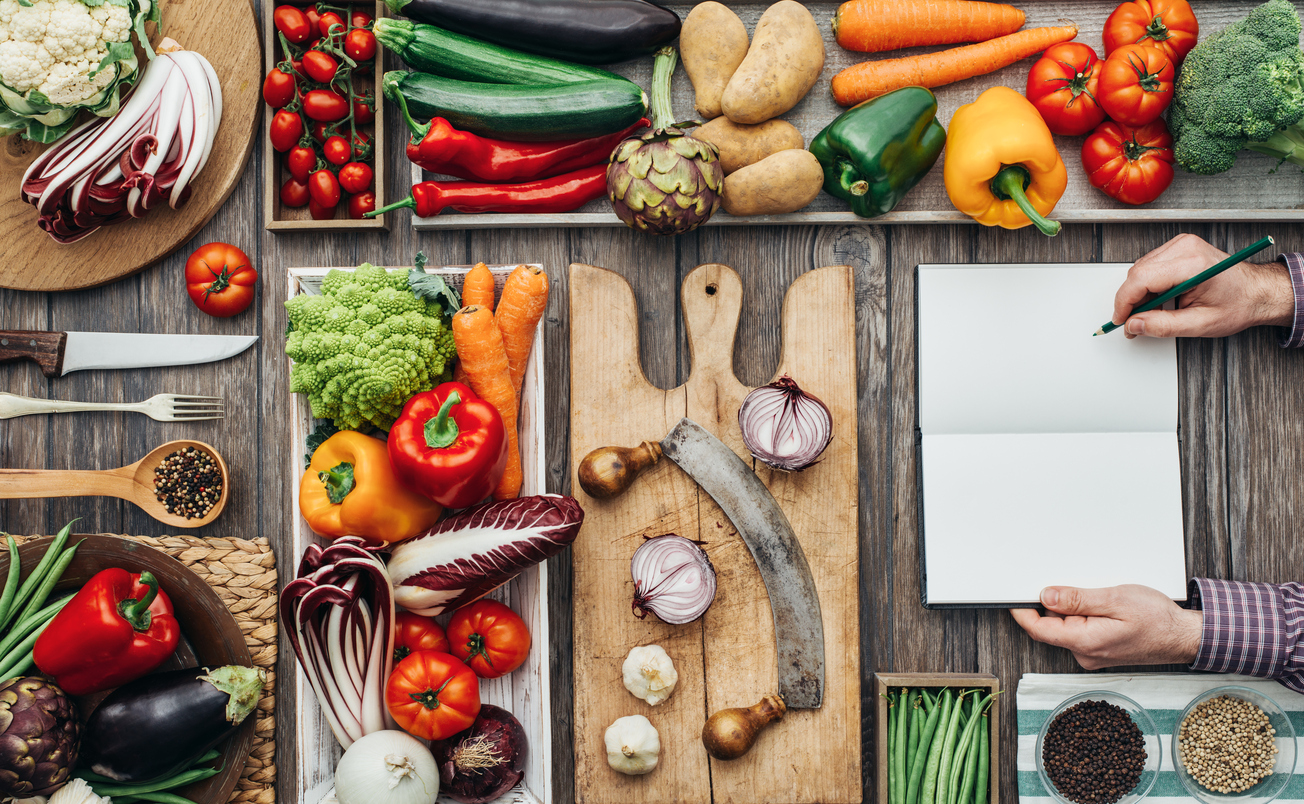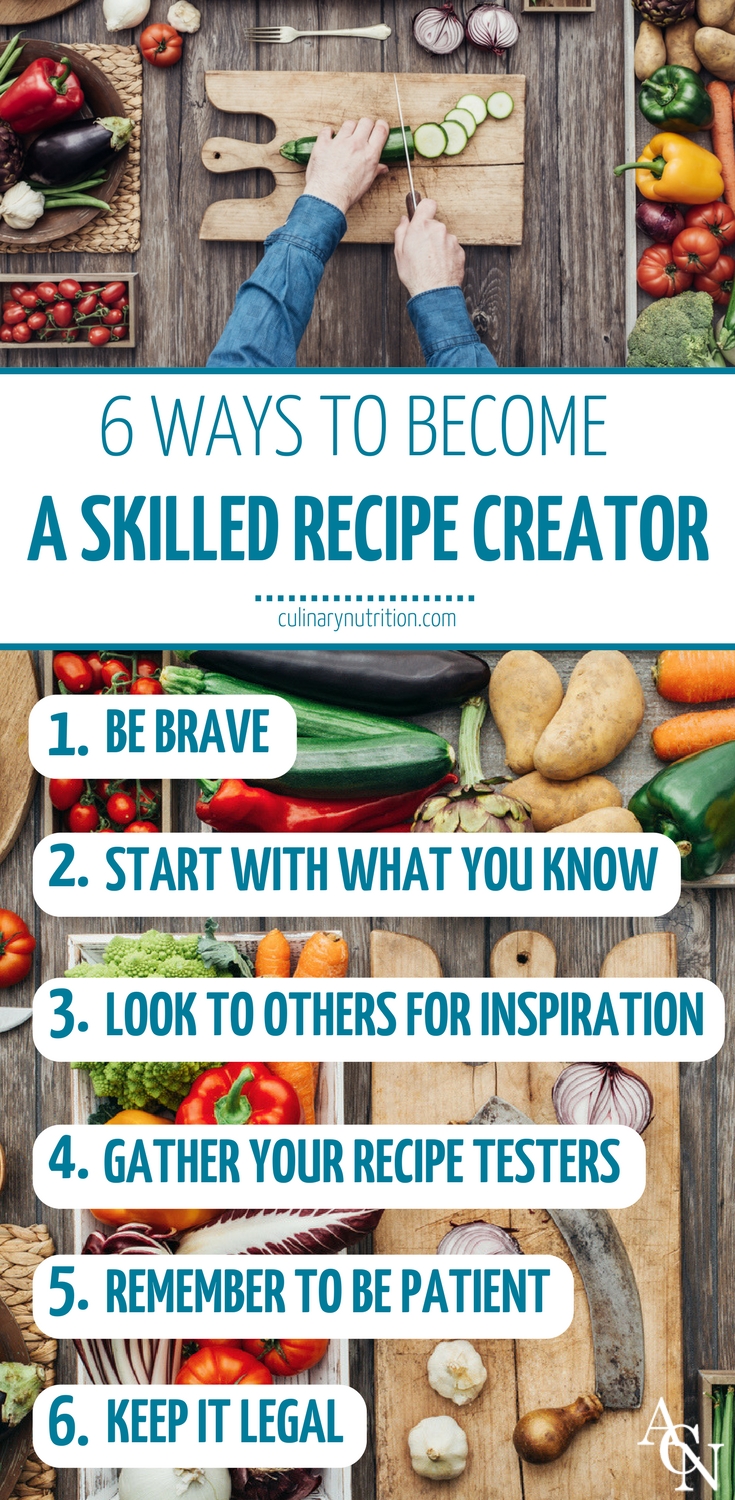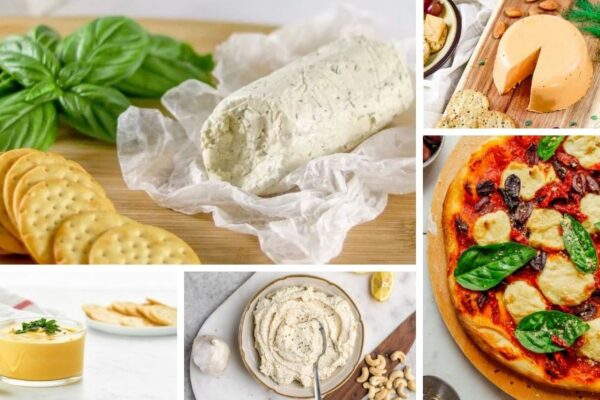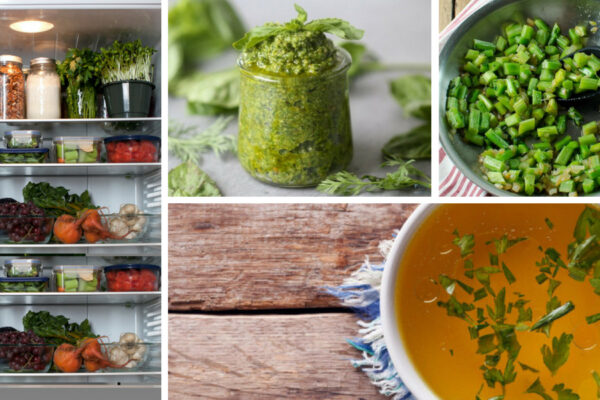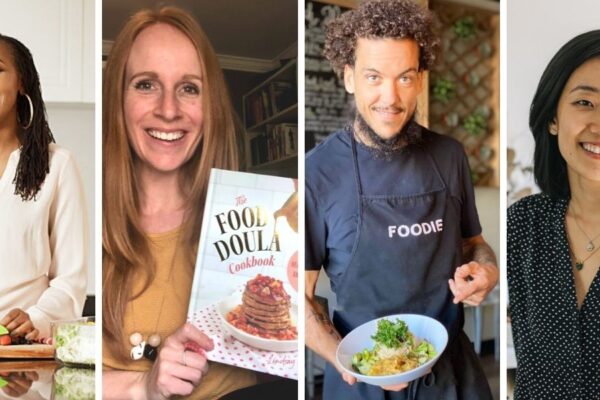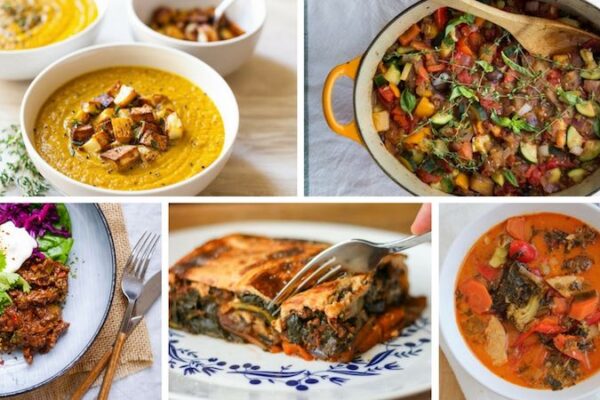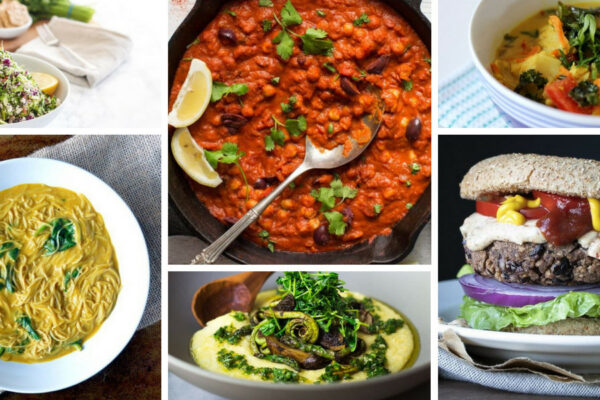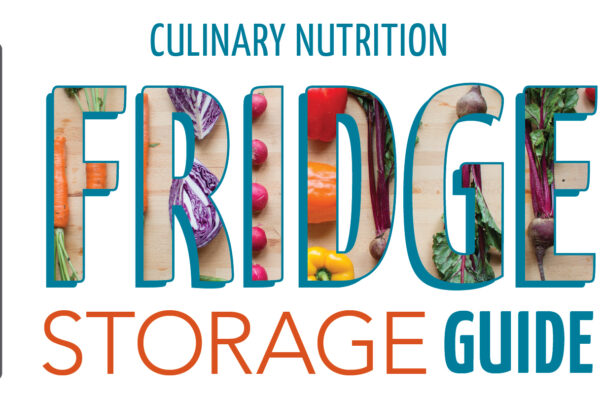How to Become a Skilled Recipe Developer
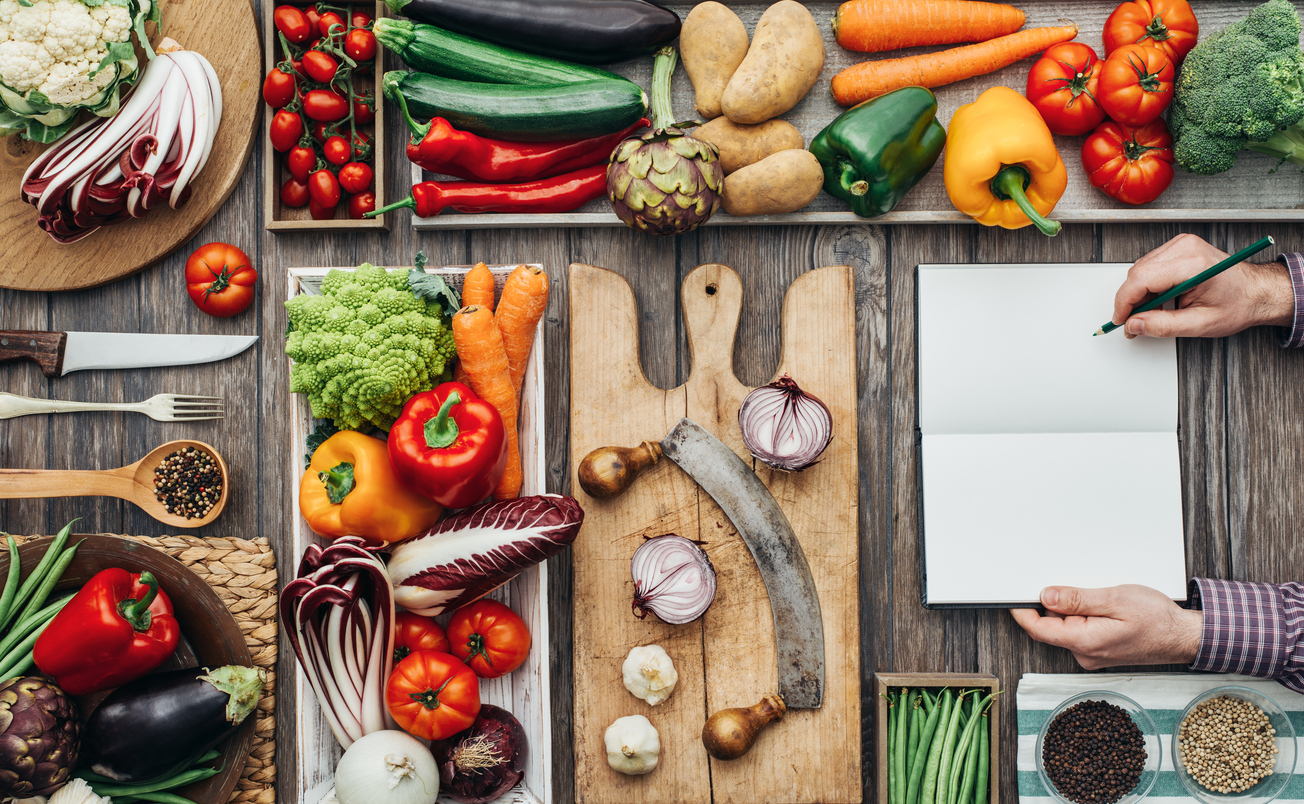
Some people are naturally intuitive cooks who can whip up an elegant, recipe-free meal with a random mish-mash of leftover produce stored in the fridge. Others are lost without a recipe as their guide. But what do we do when a recipe for what we’re craving doesn’t exist? That’s something our Culinary Nutrition Expert Program students and alumni experience – because culinary nutrition is thoughtful and deliberate, with each ingredient in a recipe playing an important role to support health. When we have unique needs and dietary philosophies (such as vegan or Paleo), sometimes we have to venture forth and create something completely new. And that can be really challenging for those of us who rely on following recipes! But with these tips, you’ll be on your way to becoming a confident and skilled recipe developer.
6 Ways to Become a Skilled Recipe DEVELOPER
1. Be brave
Cookbook and food blog devotees are usually afraid of messing things up or creating a recipe that tastes terrible and disappointing. Recipe creation involves gathering the strength, trust and optimism that you have the skills to make something delicious – and you are fully capable of this! Some of the greatest things come from a combination of confidence, curiosity and ingenuity; that’s how we ended up with aquafaba, sweet potato ‘toast’ and the Instant Pot.
It’s very rare that one of our Culinary Nutrition Experts creates something that is truly so awful it needs to go in the compost or the trash. Not every recipe is going to be a home-run, but you’ll most likely end up with something salvageable and, often, that’s how some of the best recipes are born. With each failure, we learn how to do it better the next time. So if a recipe isn’t amazing the first time around, with some tweaks (or maybe some flavourful herbs and spices) it will improve for the next iteration.
If you’re like us and are concerned about food waste, try making a small portion (1–2 servings) for a new recipe. If it works, you can easily double or triple, and if it’s not so great then you won’t have squandered a ton of ingredients or money.
2. Start with what you know
If you’ve never baked a croissant or prepared coq au vin, perhaps these aren’t the best types of recipes to start off trying to make from scratch. Yes, it’s important to be brave and adventurous, but you also need to start where you’re at and work your way up.
When you’re starting to develop new recipes, explore the ingredients and flavours that you are familiar with and see if you can create something new with them. For example, if you have a tried and true family recipe for baked mac and cheese, see if you can replicate it in a version that is gluten-free and dairy-free. Try experimenting with culinary nutrition ways to make healthier pizza. Or if you love broccoli, see if you can find a new way to incorporate it into a recipe.
Begin with the simple recipes and as you practice, you can increase the challenge and skill levels.
3. Look to others for inspiration
Most recipes aren’t created in a vacuum and in all honesty, there are very few recipes that are truly original. When dipping your toes into recipe creation, look to food blogs, Pinterest, cookbooks, magazines and other recipe resources to get a feel for the ingredient quantities and cooking methods that have already proved to be successful for others. Tested recipes from other sources can be an incredible teacher and guide for from-scratch recipe creation.
Once you have a recipe (or a collection of recipes) that embody what you’d like to make, take what you’ve learned from them, and then adapt to create your own recipe. When we make food, each of us naturally puts a unique spin on it – if you gave the exact same recipe to four home cooks they would likely turn out similar, yet distinct. (At one point, you’ve probably borrowed a recipe from a friend or family member and when you make it, it’s not quite the same.)
4. Gather your recipe testers
Great recipes are also community-driven – that’s why cookbooks and magazines have test kitchens and recipe testers. Having another pair of eyes (and hands) on a recipe allows you to gain valuable insight about flavours and textures, as well as feedback about the cooking process.
Once you’ve created and tested a recipe yourself, give it to someone else and see what they think, or ask them to help you troubleshoot a specific aspect of the recipe if needed. Ask your friends and family to be kind and diplomatic, but don’t take it personally if someone isn’t a fan of your recipe. Some recipes aren’t going to be to everyone’s tastes and that’s OK. As long as your tester can give you constructive feedback, it’s going to be useful to you.
In the Culinary Nutrition Expert Program, students at the certified level and above are paired with a buddy to test each other’s recipes and offer feedback. (Many of our buddies become friends in real life, too!).
5. Remember to be patient
Having a recipe fail, or several recipe fails in a row, can be a blow to your confidence. Trust us, we’ve been there. Try not to let it get you down. Remember that cooking is a skill, and like any other skill it takes time and effort to be proficient. Rome wasn’t built in a day, and your recipe creations won’t be either.
As you practice and hone your instincts, your mishaps will decrease and your wins will skyrocket. Plus you’ll be able to whip up new recipes more quickly and efficiently because experience has taught you what works and what doesn’t. We’ve seen this happen time and time again with our students, so you’re not alone.
6. Make it original
The ingredients of a recipe cannot be copyrighted – but other recipe elements like the headnote/introduction, the recipe directions and the photos can be. For example, you can’t copyright the ingredients for something like hummus or a burger, as these are the kinds of recipes that tend to have a similar set of ingredients.
However, if you are going to create a hummus recipe, ensure you write up your own instructions and introduction. If you intend to publish your content, discover more resources about copyright, food photography, food writing and more in our guide to starting a food blog.
Becoming a recipe developer is daunting at first, but once you get the hang of it you won’t be able to stop devising new creations!
Get your FREE Resource Library to help you be inspired in the kitchen. 35+ how-to guides, recipes & more!
Fill out the form below for instant access.
Free Resource Library
Enjoy more than 40 downloadable guides, recipes, and resources.
Free Resource Library
Enjoy more than 40 downloadable guides, recipes, and resources.















